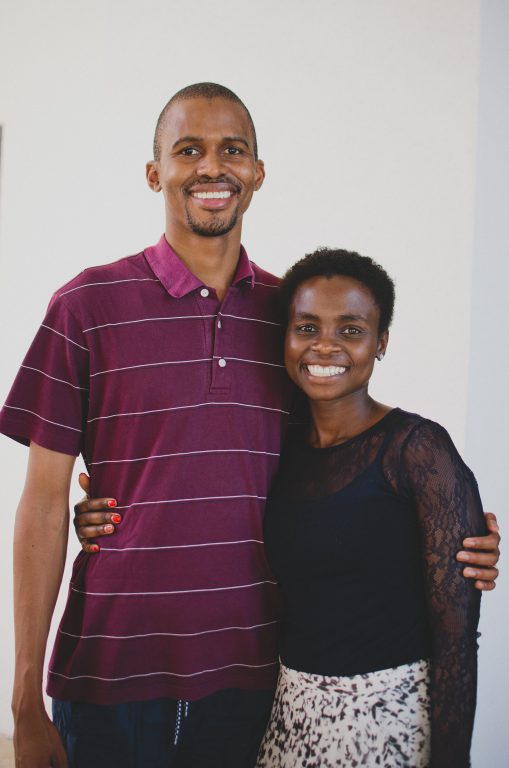Ryan van der Avoort works with students on the Howard College Campus of the University of KualaZulu, Natal in the South African city of Durban. Ryan loves training ministry apprentices. In fact Ryan and his team are training up Zulu apprentices to reach the Zulu people. We interviewed him about the work.
Why are you keen to train apprentices, Ryan?
The apprenticeship programme (MTS as you call it) is an ideal way for men and women to be grown in Christian ministry – in other words, grown in being Jesus-disciples who love and serve and disciple others. It’s ideal because of the sheer time set aside for thinking and practice, with lots of input by mentors and other leaders, and lots of outputs in coming alongside others with the Word and your life. And as we say, being an apprentice is usually a win-win situation: either you and your leaders decided you should continue further into full-time paid Christian ministry OR you’re simply better grown and equipped to continue in Christian ministry wherever the Father places you. We’re all called to Christian ministry/service, and the apprenticeship under God often supplies people a real shot in the arm to do that – it’s intense discipleship over 2 years. So, that’s a very general reason to train apprentices – it’s just good all around.
The more specific reason flows from the desire to see our living God raise up the next generation of men and women set apart to full-time paid Christian ministry. We need many more boots on the ground ‘reaching widely, investing deeply, and multiplying ministry’ on a full-time paid basis. And we need that next generation of men and women who, in turn, will invest themselves in the (next) next generation of men and women.
Tell us about the ministry you work for, and the kinds of people who train under you?
I serve with a university ministry called ‘The Bible Talks’ (TBT). We carry out our work in partnership with as many local churches as possible to see university students reached with the good news of Jesus. Our partnership with some local churches also includes ‘sharing’ apprentices in a 50/50 split of time, energies, and resources. The apprentices gain excellent inside understanding of (and opportunity to serve within) the local church, and from the university ministry are never lacking opportunities for evangelism and edification at a mostly peer level.
TBT currently has a staff team of 11 working across 4 campuses. 6 of those 11 are apprentices. 10 of the 11 are South African, 8 of those Zulu. In terms of who we minister to: our region’s universities mostly reflect the province/state demographics with the overwhelmingly majority of our students being Zulu, but also including others from, for instance, the Khosa, Bhaca and Swati tribes.
Returning to the apprentices we train: it’s often a great challenge to become an apprentice. For instance:
- Many of our apprentices, and potential apprentices, carry tremendous pressure to support their families (wider than just nuclear) after university. Some families have financially put all their eggs in one basket to make sure one of the children can go to university for the sake of the wider family post-university.
- Our apprentices are unable to personally fund themselves through family and friends to do the apprenticeship – their social contacts simply don’t have enough money. Instead, the movement of money is often the opposite: many of our apprentices send money to family and friends. Practically this means TBT as an organisation, with local churches, must raise money for apprentice salaries.
- And then there are frequently other family-based challenges: the family may hold to African Traditional Religion and so frown upon their child being a Christian, let alone being employed by ‘the church’. Or, if the background is Christian (and so most likely to be Prosperity Gospel based), then there are often misunderstandings of what their child is actually doing, and what their future might look like.
To give you a snapshot of those trained by TBT as apprentices, let me highlight three men currently at each of the three stages of our desired pipeline for full-time paid Christian ministry, namely: apprenticeship, further theological training, and ministry placement.

[Ryan is standing to the far left of the photograph]
i) Siphesihle – 1st year apprentice
Siphesihle (seated bottom right of the staff photo above) studied at one of the campuses where TBT is and became one of our TBT student leaders, finishing with a degree in Economics and English. He is now a first-year apprentice with TBT and a local church. We hope he heads off to GWC (George Whitefield College – in Cape Town) in 2022 after his apprenticeship. And we’ve begun tentative conversations about him heading back to the rural north coast of our province post College. He may need to be bi-vocational, teaching in a school, to pastor there.

ii) Kwazi – final year at Theological College
Kwazi came to university from a rural part of Zululand and was evangelised and discipled by TBT. After completing a degree in music he was an apprentice for two years (2016-2017) with TBT and a local church. And then 2018 to present he has been at GWC. We expect him to come back to work full-time for TBT, and in the future to take over as Campus Directors on one of the campuses. We pray he will help model and teach Christ as Lord and help see, by the Spirit, the next generation of university students reached with the good news of Jesus.

iii) Musa and Masana – church planters
Musa and Masana were key TBT students while I was still an apprentice with TBT back in the days. In 2008, after his Civil Engineering studies, Musa became an apprentice with TBT and a local Durban church. After that he worked for a few years, with Musa and Masana (an accountant) marrying in 2010. Then from 2014 to 2016 they trekked off to GWC for Musa to study while Masana worked. From Cape Town they went to Johannesburg. And in April 2018 he and Masana planted a church called Christ Central Soweto. Soweto is the largest township in South Africa!
You’re training up Zulu pastors. Why is that important?
Well, we’re training up anyone – the Lord commanded us to make disciples of all nations. But yes, because of where we’re situated, we’re particularly taking advantage of the opportunity to reach and invest in Zulu men and women. And one of our great desires includes seeing many Zulu pastors raised up by the Lord. Why is that important?
Because, for all the cultural Christianity in South Africa, the people of our country and province are still largely without a saving knowledge and relationship with the Triune God. Because, where ‘Christianity’ is believed and taught, most of it follows the false promises of the Prosperity Gospel. And because many still look to their dead ancestors to mediate for them, instead of to the living Jesus.
And so, we particularly long to see the news of Jesus, from the Scriptures, go out into many of the township and rural parts of Kwa-Zulu Natal (our province) – vast swathes where the majority of those men and women are Zulu speakers, and don’t love and obey Jesus. We eagerly desire to see Zulu-speaking pastors faithfully coming alongside the people of these regions, sharing their lives and the word of truth, the gospel. We trust that the Spirit will work through the message of Jesus to bring life.
